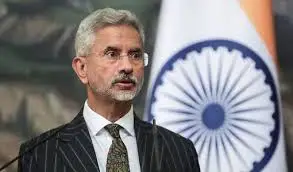Dealings with Pakistan will be strictly bilateral: Jaishankar

India’s External Affairs Minister, S. Jaishankar, has made it clear that India will maintain a strictly bilateral approach in its dealings with Pakistan. He emphasized that future talks or negotiations will take place only between the two countries without involving any third party or mediator.
Speaking to reporters recently, Jaishankar said, “Our dealings with Pakistan are and will remain strictly bilateral.” This statement reflects India’s consistent policy of managing sensitive issues through direct communication with Pakistan. The government believes that bilateral talks provide a clear and effective way to resolve complex problems.
Jaishankar pointed out that involving third parties can complicate matters. “Direct talks allow us to address issues head-on and ensure accountability,” he said. The minister also highlighted the importance of handling disputes such as border tensions, terrorism, and cross-border infiltration directly with Pakistan.
This firm stance comes amid ongoing challenges in the India-Pakistan relationship. Over the years, both countries have faced multiple conflicts, and dialogue has often stalled due to mutual mistrust and incidents of violence. India’s approach to keep talks strictly bilateral aims to avoid these complications.
Jaishankar stressed that while India remains open to dialogue, it expects Pakistan to take concrete steps against terrorism. “Peace cannot come at the cost of our security,” he said. He reaffirmed India’s zero-tolerance policy for any acts of terror that originate from Pakistani soil.
The minister’s remarks also signal India’s confidence in managing its diplomatic affairs independently. By rejecting third-party mediation, India asserts its sovereignty and control over the negotiation process. It also sends a message that India will engage Pakistan on its own terms, demanding accountability and clear action.
Experts believe that this approach can help reduce misunderstandings and miscommunications often caused by external influences. “Bilateral talks streamline the process and keep both countries responsible for the outcomes,” said a senior diplomat. This method also reflects the evolving dynamics of South Asia, where regional powers prefer direct dialogue to manage conflicts.
Jaishankar’s comments came amid recent border skirmishes and cross-border incidents that have raised tensions in the region. India continues to strengthen its defenses along the Line of Control and remains vigilant against any security threats. At the same time, diplomatic efforts continue to seek peaceful resolutions.
In recent years, India has also focused on improving its international relations while handling the Pakistan issue quietly through bilateral channels. The country has built stronger ties with global powers, which it leverages to maintain pressure on Pakistan to curb terrorism.
Analysts note that this clear message from Jaishankar reinforces India’s stand on sovereignty and security. It also reflects the frustration with repeated attempts at dialogue that failed to produce lasting peace. The bilateral approach demands Pakistan’s commitment to concrete actions, not just words.
Despite challenges, experts stress that dialogue remains crucial for long-term peace in South Asia. Many believe that if Pakistan genuinely moves against terror groups and respects ceasefire agreements, India could consider expanding talks.
Meanwhile, India is also focusing on internal development and defense preparedness. It is enhancing border infrastructure, increasing surveillance, and upgrading military capabilities to deal with any threats effectively.
In conclusion, Jaishankar’s statement marks a firm policy decision by India to manage its complex relationship with Pakistan through direct talks only. This approach emphasizes accountability, security, and sovereignty. It signals to Pakistan and the international community that India will not accept interference in its diplomatic matters and will engage Pakistan strictly on its own terms.






